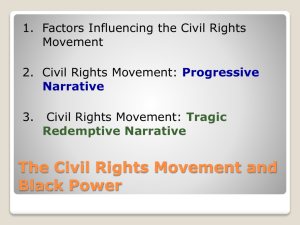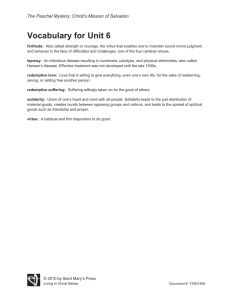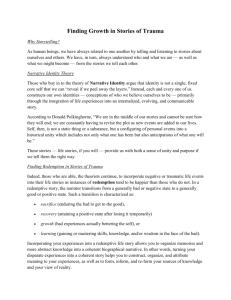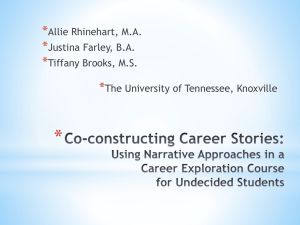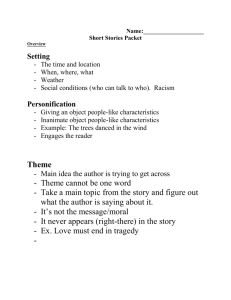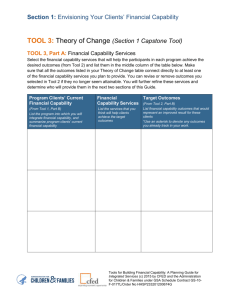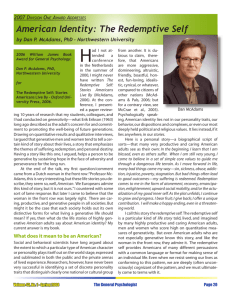Heritage to Legacy Introductory Discussion Paper
advertisement
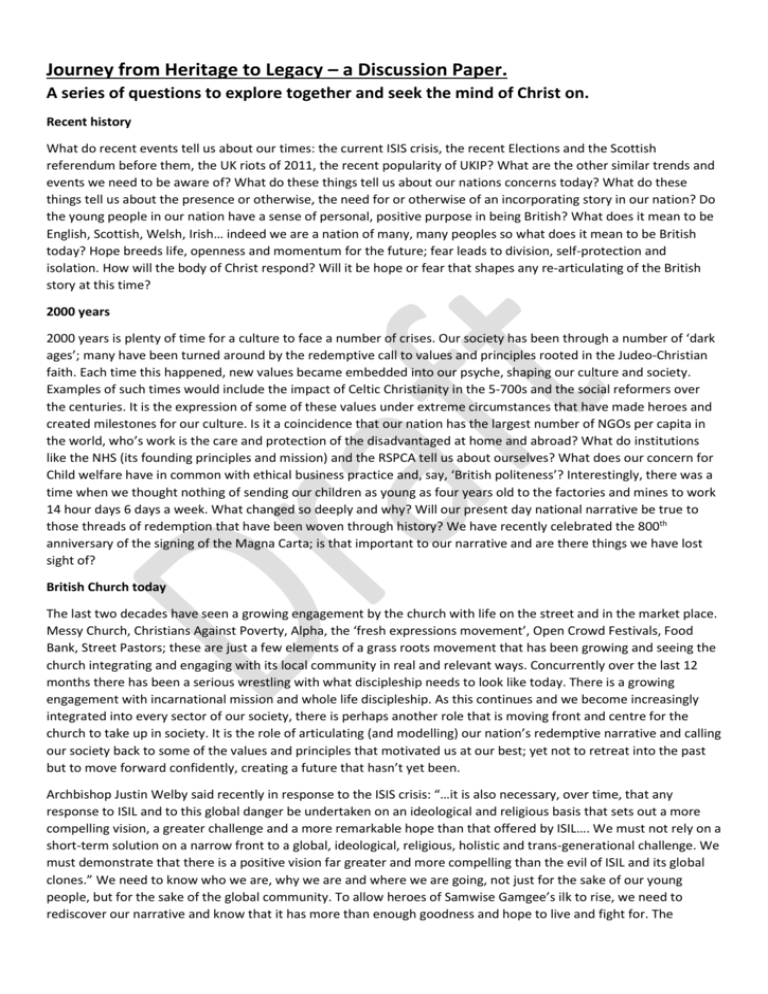
Journey from Heritage to Legacy – a Discussion Paper. A series of questions to explore together and seek the mind of Christ on. Recent history What do recent events tell us about our times: the current ISIS crisis, the recent Elections and the Scottish referendum before them, the UK riots of 2011, the recent popularity of UKIP? What are the other similar trends and events we need to be aware of? What do these things tell us about our nations concerns today? What do these things tell us about the presence or otherwise, the need for or otherwise of an incorporating story in our nation? Do the young people in our nation have a sense of personal, positive purpose in being British? What does it mean to be English, Scottish, Welsh, Irish… indeed we are a nation of many, many peoples so what does it mean to be British today? Hope breeds life, openness and momentum for the future; fear leads to division, self-protection and isolation. How will the body of Christ respond? Will it be hope or fear that shapes any re-articulating of the British story at this time? 2000 years 2000 years is plenty of time for a culture to face a number of crises. Our society has been through a number of ‘dark ages’; many have been turned around by the redemptive call to values and principles rooted in the Judeo-Christian faith. Each time this happened, new values became embedded into our psyche, shaping our culture and society. Examples of such times would include the impact of Celtic Christianity in the 5-700s and the social reformers over the centuries. It is the expression of some of these values under extreme circumstances that have made heroes and created milestones for our culture. Is it a coincidence that our nation has the largest number of NGOs per capita in the world, who’s work is the care and protection of the disadvantaged at home and abroad? What do institutions like the NHS (its founding principles and mission) and the RSPCA tell us about ourselves? What does our concern for Child welfare have in common with ethical business practice and, say, ‘British politeness’? Interestingly, there was a time when we thought nothing of sending our children as young as four years old to the factories and mines to work 14 hour days 6 days a week. What changed so deeply and why? Will our present day national narrative be true to those threads of redemption that have been woven through history? We have recently celebrated the 800th anniversary of the signing of the Magna Carta; is that important to our narrative and are there things we have lost sight of? British Church today The last two decades have seen a growing engagement by the church with life on the street and in the market place. Messy Church, Christians Against Poverty, Alpha, the ‘fresh expressions movement’, Open Crowd Festivals, Food Bank, Street Pastors; these are just a few elements of a grass roots movement that has been growing and seeing the church integrating and engaging with its local community in real and relevant ways. Concurrently over the last 12 months there has been a serious wrestling with what discipleship needs to look like today. There is a growing engagement with incarnational mission and whole life discipleship. As this continues and we become increasingly integrated into every sector of our society, there is perhaps another role that is moving front and centre for the church to take up in society. It is the role of articulating (and modelling) our nation’s redemptive narrative and calling our society back to some of the values and principles that motivated us at our best; yet not to retreat into the past but to move forward confidently, creating a future that hasn’t yet been. Archbishop Justin Welby said recently in response to the ISIS crisis: “…it is also necessary, over time, that any response to ISIL and to this global danger be undertaken on an ideological and religious basis that sets out a more compelling vision, a greater challenge and a more remarkable hope than that offered by ISIL…. We must not rely on a short-term solution on a narrow front to a global, ideological, religious, holistic and trans-generational challenge. We must demonstrate that there is a positive vision far greater and more compelling than the evil of ISIL and its global clones.” We need to know who we are, why we are and where we are going, not just for the sake of our young people, but for the sake of the global community. To allow heroes of Samwise Gamgee’s ilk to rise, we need to rediscover our narrative and know that it has more than enough goodness and hope to live and fight for. The alternative as we have been seeing in recent months and years is a generation that accepts the myriad ways to rather die from despair than live with hope. Winston Churchill said: "When one generation no longer esteems its own heritage and fails to pass the torch to its own children, it is saying in essence that the very foundational principles and experiences that make it the society that it is, are no longer valid. What is required when this happens and the society has lost its way, is for leaders to arise who have not forgotten the discarded legacy and who love it with all their hearts. They can then become the voice of that lost generation, wooing an errant generation back to the faith of their fathers, back to the ancient foundations and the bedrock values." This is not a call to reminisce over the ‘good old days’ but rather, to learn from our past whilst recognising the treasures in our history that remind us of who we are, our story, SO THAT we can rise, name and celebrate all it means to be us, together, today and into the future. So what?: Is it time to put some strategic thought into how we, the body of Christ might rise to the challenge of this moment? How can we together respond to the things that our nation is concerned about in ways that are both relevant to the specifics and also address their roots? In so doing, how do we rediscover our nation’s redemptive narrative? How do we ‘woo a generation back’ not to the past but rather to the things that would make for our peace and leave a legacy of hope and life? What follows is a small sample of initiatives that have been emerging representing tactics which, if woven together and added to, could be developed into a strategy for the transformation of our society in our day. Manifestos and discussion papers - The Scottish EA put together a manifesto as its contribution to the conversation around the Scottish referendum. http://www.eauk.org/scotland/what-kind-of-nation.cfm . The House of Bishops, The Catholic Bishops of England and Wales and the Black Majority Churches all released thought provoking papers in the lead up to the recent elections. https://www.churchofengland.org/media/2170230/whoismyneighbour-pages.pdf http://www.catholicew.org.uk/Home/News/Election-Letter2 The EA is about to release the findings form their survey of British values. This is all to name but some of the work done in this area; how can we build on it? Citizens UK – a growing grassroots movement that releases the voice of the people to be heard and bridges the gap between the streets and the corridors of power. http://www.citizensuk.org/ Story Telling- the skill of helping individuals, families and communities reach and articulate their story – past, present and future. From time to time organisations and individuals have focused on this type of work to great effect, what is the role of this process in our current time? Parables – The concept of social myth in shaping a culture is a powerful one. Who are our heroes and why? What is it about them that resonates so deeply with us? How can we use storytelling to remind people of our journey so far and how it informs our current reality? How can we do this in such a way that people get a glimpse of Christ and as well as renewed hope for today and tomorrow? Work is being done on this by the likes of Fusion Youth and Community UK www.fusionyac.org and Joshua Jost www.joshuajost.com Fusion Youth and Community’s British Pilgrimage of Hope. - An interactive journey exploring how, throughout the history of the UK, God has and still uses small groups of friends to change the world – exploring the past, engaging the present and dreaming the future. www.fusionyac.org/pilgrimage Media campaign – ads, press releases, interviews, you tube spots, social networking movement. How will we use the media to help shape the consciousness of our nation? The Alpha campaign is a fabulous example. Social Policy - What areas of policy are in gravest danger of taking us away from our redemptive narrative as a nation – what does it mean to provide an alternative that addresses the real questions but upholds those values that have shaped our culture and society. Citizens UK and others are doing great work in this area, in addition the EA is seeking to empower local churches to engage with the public sector and support congregants who work in the public sector. What more is needed? Are there other tactics for the healing of our society? What in this paper do you find yourself resonating with? What additional questions or issues do you think need to be raised in this discussion? What other relevant tactics are you aware of that could be added to the sample above? What are your thoughts on strategic next steps or ways forward for healing and transforming our society and turning our nation back to its redemptive heritage and narrative?
